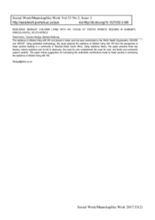ABSTRACT
The resilience of children living with HIV and placed in foster care has been overlooked by the World Health Organisation, UNAIDS and UNICEF. Using qualitative methodology, this study explored the resilience of children living with HIV from the perspective of foster parents residing in a community in KwaZulu-Natal, South Africa. Using resilience theory, this paper presents three key themes, namely resilience and its link to disclosure, the need for care complements the need for cash, and family and community support systems. This paper makes suggestions for harnessing the undeniable contributions made by foster parents in enhancing the resilience of children living with HIV.

